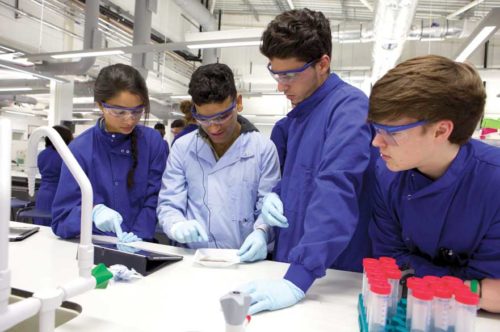Medicinal and biological chemistry is the foundation of modern medicine. The life sciences industry is one of the largest industrial sectors in the UK, where you could use your skills to have a positive effect on health and wellbeing worldwide.
This is a truly multidisciplinary science. While chemistry forms the core of this Medicinal and Biological Chemistry degree, you’ll also study biology, physiology, biochemistry and pharmacology to understand the links between human disease and its prevention and treatment through drug design.
To prepare you for the workplace there’s a significant amount of simulated work-based learning as part of this course, as well as employability and professional development activities. In your final year, for example, you can complete a major project in the workplace or pursue an industry-linked project.
What you will study
The first year provides an excellent grounding in all three branches of chemistry – inorganic, organic and physical – as well as fundamental biology topics. In your second and final years, you’ll progress to study topics at the interface of chemistry and biology, such as drug design, toxicology, biochemistry and heterocyclic chemistry.
Foundation Year: Medicinal and Biological Chemistry Degree
- Foundation Biology
- Introduction to Human Anatomy and Physiology
- Key Skills and Professional Development
- Foundation Chemistry
- Physical Science
- Scientific Data Literacy
The first year provides an excellent grounding in all three branches of chemistry – inorganic, organic and physical – as well as fundamental biology topics. In your second and final years, you’ll progress to study topics at the interface of chemistry and biology, such as drug design, toxicology, biochemistry and heterocyclic chemistry.
Year One: Medicinal and Biological Chemistry Degree
- Organic Chemistry
- Physical Chemistry
- Inorganic Chemistry
- Biological Chemistry
- Biomedical Research Skills
- Microorganisms and the Dynamic Cell
Year Two: Medicinal and Biological Chemistry Degree
- Synthetic Organic Chemistry
- Heterocyclic chemistry and an Intriduction to Drug Design
- Bioinorganic Chemistry
- Metabolism and Biochemistry
- Pharmacology
- Analytical Techniques in the Biosciences
Year Three: Medicinal and Biological Chemistry Degree
- Toxicology
- Advanced Organic Chemistry
- Advanced Pharmacology
- Topics in Medicinal Chemistry
- Professional Practice, Employability and project
Teaching
A blended learning and teaching approach is utilised to provide the students with subject specific and key skills. Typically all chemistry modules consist of a mix of lectures, tutorials, workshops and practical laboratory sessions.
Students are provided with numerous learning activities including written coursework, project work, group work, practicals (with group sizes tailored to the activity); problem solving sessions, selfstudy assignments, oral and poster presentations. independent study, work related learning, on-line self assessments etc. Student will receive around 15 contact hours per week and will be expected to conduct at least one hour of individual study for every one hour of contact.
Teaching staff draw on research interests and scholarly activity, including conferences, to enhance lectures, laboratory work and develop final year projects. In general, final year projects are often of an applied science nature or involve the use of a range of synthetic techniques and analytical instrumentation in line with individual teaching staff research interests.
Zobacz więcej na stronie uniwersytetu >>
Wiza studencka do Wielkiej Brytanii
Aby studiować w Wielkiej Brytanii potrzebujesz wizy studenckiej. Aby złożyć wniosek o taką wizę studencką musisz zdjać certyfikat językowy na poziomie B2.
Uważaj! Do celów wizowych musisz wybrać wyłącznie egzamin w wesji Secure English Language Test (SELT) UKVI .
Co to jest test SELT UK VI registration? Przeczytaj więcej o testach SELT UKVI >>




















